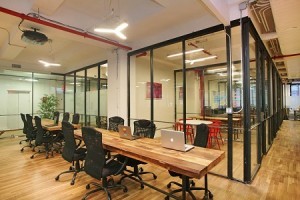Rent of AAA-grade office space to rise by 10%
With members increasing at higher than the global average of 40 percent, co-working providers in Asia Pacific have leased over eight million sq ft over the last two years, revealed Cushman and Wakefield.It noted that memberships of enterprise clients more than doubled in the last 12 months, while the share of freelancers and independent workers contracted by almost 15 percent in the last three years.“There are signs that co-working is weaning off its dependence on tech and startups and positioning itself as a pillar in corporate real estate strategy. For most corporate occupiers, co-working has become a business solution, not just a real estate alternative,” said Chris Browne, Cushman and Wakefield’s head of global occupier services in Asia Pacific.“With rent growth in the region expected to accelerate in the next two years, cost containment strategies will necessitate incorporating flexible working arrangements to manage real estate footprint.”With this, landlords across the region have, either by themselves or by partnering with an operator, embraced co-working services. It has even become a staple in new office developments.  In Singapore, for instance, buildings in and around the core business district that are set for completion in the next two years will feature co-working services.WeWork, for example, has leased 40,000 sq ft in the current redevelopment of the former Funan IT Mall, while the upcoming Paya Lebar Quarter on Singapore’s city fringe has set aside up to 15 percent of the available space at its three office towers to co-working services.Meanwhile, the start-up boom and enormous business potential are drawing established co-working operators to Southeast Asia.“The region’s emerging markets, particularly in SEA, are probably one of the last frontiers for the co-working movement to flourish,” noted Sigrid Zialcita, Cushman and Wakefield’s managing director for Asia Pacific research.Corporates in this sub-region are currently not considering co-working seriously due to the “lack of appropriate options that have the size and expertise to meet their needs”, she said.But given the growth momentum of the co-working industry, Zialcita expects this to change in the immediate future. “We expect the footprint of co-working spaces in Asia Pacific to double in the next three to five years.”Source: CommercialGuru,
In Singapore, for instance, buildings in and around the core business district that are set for completion in the next two years will feature co-working services.WeWork, for example, has leased 40,000 sq ft in the current redevelopment of the former Funan IT Mall, while the upcoming Paya Lebar Quarter on Singapore’s city fringe has set aside up to 15 percent of the available space at its three office towers to co-working services.Meanwhile, the start-up boom and enormous business potential are drawing established co-working operators to Southeast Asia.“The region’s emerging markets, particularly in SEA, are probably one of the last frontiers for the co-working movement to flourish,” noted Sigrid Zialcita, Cushman and Wakefield’s managing director for Asia Pacific research.Corporates in this sub-region are currently not considering co-working seriously due to the “lack of appropriate options that have the size and expertise to meet their needs”, she said.But given the growth momentum of the co-working industry, Zialcita expects this to change in the immediate future. “We expect the footprint of co-working spaces in Asia Pacific to double in the next three to five years.”Source: CommercialGuru,
